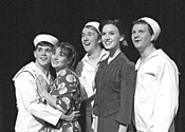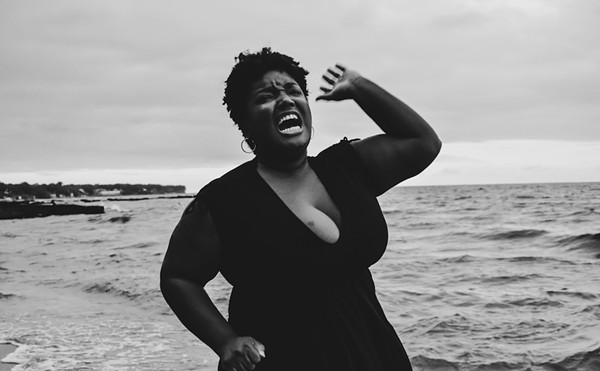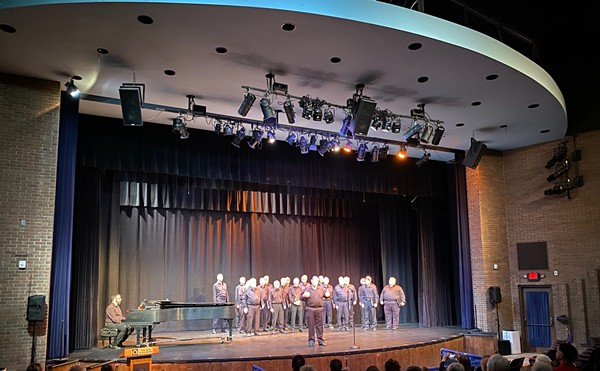The same was true back in 1944, when folks back home were exhausted by years of warfare and hungry for a frolic at the theater. The perfect answer was delivered by the high-powered combination of classical composer-conductor Leonard Bernstein, Tin Pan Alley tunesmiths Betty Comden and Adolph Green, and choreographer Jerome Robbins. Taking the timeless idea of enlisted men looking for love and excitement, they created On the Town, a big, boisterous show featuring a challenging, jazz-infused orchestral score, practically nonstop dancing, and lots of witty lyrics. Now being bravely tackled by Beck Center, the devilishly difficult show's many bright spots are dimmed by this production's strangely enervating pace, slipshod set design, and thin musical palette.
The slim story is constructed around three sailors -- Gabey, Chip, and Ozzie -- who hit the pier at 6 a.m. on a 24-hour leave. Their opening anthem to the glory of the city that awaits is the most well-known song in the show, and for good reason. It's hard to beat the infectious, uptempo beat and the street-smart lyrics: "New York, New York, a helluva town/The Bronx is up and the Battery's down/The people ride in a hole in the ground." Soon, the boys split up, with super-efficient Chip following his dad's list of must-see landmarks, randy Ozzie looking to get laid, and all three looking for a woman named Ivy (statuesque Katelyn Blockinger), whom innocent Gabey fell in love with after spying her "Miss Turnstile" poster on the subway.
In a New York minute, Chip meets Hildy, a nymphomaniac cabbie, who drives the young gob nuts on the way to her apartment in a hack that looks, unfortunately, like a chicken coop on wheels. Meanwhile, Ozzie mistakenly winds up in the Museum of Natural History and gets pegged as a neo-Neanderthal by anthropologist Claire De Loone, who believes in a hands-on approach to the study of man. Back at her flat, Ozzie is surprised by Claire's fiancé, the terminally understanding Pitkin W. Bridgework (Paul Floriano in an only faintly amusing turn), who meekly accepts his betrothed's roving eye until a second-act comeuppance. And, true to musical-comedy fates, Gabey stumbles onto Ivy while she's singing upside down at the studio of Madame Dilly, a seriously sozzled voice coach.
Clearly, this is all intended to be a frivolous romp, but many of the jokes in the Comden-Green book either haven't aged well or aren't delivered with the proper crispness and snap. As for the music, it's a bear to play and sing. Beck Center's 13-member orchestra is maybe a third the size it needs to be to do justice to Bernstein's score, which dashes from Prokofiev-style ballet numbers (which, although lovely, slow the proceedings) to the faux-operatic "Carried Away." With lots of curves to negotiate on this serpentine musical course, the orchestra, under the baton of Larry Goodpaster, spins out a few times. Choreographer Martin Cespedes has clearly done yeoman's work, since virtually every scene includes dance of some sort, and he fills the stage with energetic if not inspired movement.
Among the three sailors, Sean Szaller is endearing as the innocently romantic Gabey, with his song "Lonely Town" a tender high point. Joe Fornadel and Colin Cook, playing Ozzie and Chip, respectively, sing well, but don't take enough chances to make their characters memorable. Amiee Collier, who has the showy role of Hildy, registers this woman as an unfettered free spirit, but misses some of the sexy fun in the song "I Can Cook, Too." As the libidinous and brow-beating Claire, Maggie Wirfel generates some laughs along with a few sparks. And her singing with Collier of the other familiar tune, "Some Other Time," is a genuine moment of reflection and loss.
Director Fred Sternfeld is a past master at staging large-cast shows (his productions of Fiddler on the Roof and Ragtime, the Musical were nothing short of exquisite), but here his sure hand seems to falter. The overall pacing feels slack, draining energy from the proceedings, and there's a distressing lack of attention to detail (scene changes are lethargic). Ultimately, scenic designer Richard Gould's backdrop montage of skyscrapers and postcards is symbolic of much of this production: a well-meaning effort that's too often bland, beige, and clumsily done.













